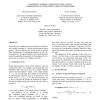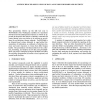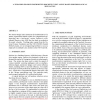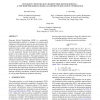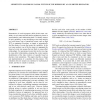99
Voted
WSC
2007
15 years 3 months ago
2007
The Logistics Composite Model (LCOM) is a stochastic, discrete-event simulation that relies on probabilities and random number generators to model scenarios in a maintenance unit ...
91
Voted
WSC
2007
15 years 3 months ago
2007
We consider the problem of selecting the best system using simulation-based ordinal optimization. This problem has been studied mostly in the context of light-tailed distributions...
92
Voted
WSC
2007
15 years 3 months ago
2007
We present a single-stage multiple-comparison procedure for comparing parameters of independent systems, where the parameters are not necessarily means or steady-state means. We a...
95
Voted
WSC
2007
15 years 3 months ago
2007
We develop new confidence-interval estimators for the mean and variance parameter of a steady-state simulation output process. These confidence intervals are based on optimal li...
103
Voted
WSC
2007
15 years 3 months ago
2007
This presentation follows up the talk last year to WINFORMS (The Washington Institute for Operations Research and The Management Sciences) in which an approach developed for the a...
90
Voted
WSC
2007
15 years 3 months ago
2007
We discuss design issues related to the transformation of a mature Agent-Based Model (ABM) for computational epidemiology into a “grid-aware” version. EpiSims is a distributed...
99
Voted
WSC
2007
15 years 3 months ago
2007
Conceptual modeling, deciding what to include in the model, is a very important task in the modeling process. However, it has so far received relatively little attention in the li...
107
Voted
WSC
2007
15 years 3 months ago
2007
Response Surface Methodology (RSM) is a metamodelbased optimization method. Its strategy is to explore small subregions of the parameter space in succession instead of attempting ...
101
Voted
WSC
2007
15 years 3 months ago
2007
Fluctuations of work-in-progress (WIP) levels cause variability of cycle time and often lead to productivity losses in semiconductor wafer fabrication plants. To identify sources ...
66
Voted
WSC
2007
15 years 3 months ago
2007
An immense amount of research work has been done in the areas of scheduling and re-scheduling of various types of manufacturing systems. In this paper we present a simulation assi...

